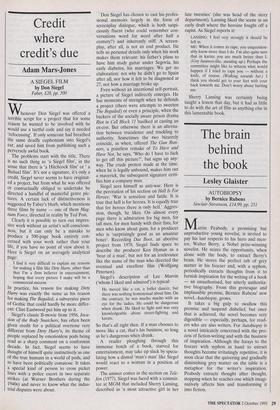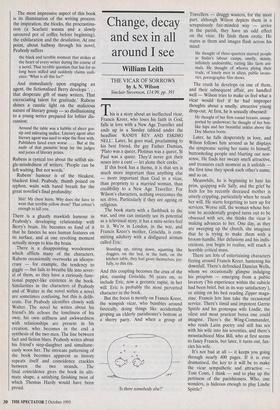The brain behind the book
Lesley Glaister
AUTOBIOPSY by Bernice Rubens Sinclair-Stevenson, £14.99, pp. 231 Martin Peabody, a promising but unproductive young novelist, is invited to pay his last respects to his hero and men- tor, Walter Berry, a Nobel prize-winning novelist. He seizes the opportunity, when alone with the body, to extract Berry's brain. He stores the perfect orb of grey matter in his freezer and, with a syphon, periodically extracts thoughts from it to furnish inspiration for the writing of a book — an unauthorised, but utterly authorita- tive biography. From this grotesque and implausible premise, Bernice Rubens' new novel, Autobiopsy, grows.
It takes a big gulp to swallow this premise and suspend disbelief, but once that is achieved, the novel becomes very digestible — especially, perhaps, for read- ers who are also writers. For Autobiopsy is a novel intricately concerned with the pro- cess of fiction-writing and with the business of inspiration. Although the forays to the freezer with syphon in hand to extract thoughts become irritatingly repetitive, it is soon clear that the quivering and gradually diminishing grey matter on the table is a metaphor for the writer's inspiration. Peabody extracts thought after thought, stopping when he reaches one which imagi- natively affects him and transforming it into fiction.
The most impressive aspect of this book is its illumination of the writing process: the inspiration, the blocks, the procrastina- tion (a Scarlatti sonata and a slowly savoured pot of coffee before beginning), the exhilaration and the desolation. At one point, about halfway through his novel, Peabody suffers
the black and terrible moment that strikes at the heart of every writer during the course of a novel. That terrible question that has for so long been stifled and suddenly claims audi- ence: 'What is all this for?'
And immediately upon engaging an agent, the fictionalised Berry develops . . that desperate gift of many writers. That excruciating talent for gratitude.' Rubens shines a caustic light on the malicious nature of literary gossip — so disillusioning to a young writer prepared for loftier dis- cussion:
Around the table was a babble of sheer gos- sip and salivating malice. Literary agent after literary agent was used to wipe the floor with. Publishers fared even worse . . . But at the nadir of that parasitic heap lay the judges and juries of literary prizes.
Rubens is cynical too about the selfish sin- gle-mindedness of writers. 'People. can be left waiting. But not words.'
Rubens' humour is of the bleakest, blackest kind. Peabody, thumb poised on syphon, waits with bated breath for the great novelist's final profundity:
Shit! My chest hurts. Why does she have to wear that terrible yellow dress? That colour's enough to kill you.
There is a ghastly mawkish humour in Peabody's developing relationship with Berry's brain. He becomes so fond of it that he fancies he sees human features on its surface, and at one revolting moment actually stoops to kiss the brain.
There is a disappointing woodenness which afflicts many of the characters. Rubens occasionally overworks an idiosyn- crasy — for example, the tendency to giggle — but fails to breathe life into sever- al of them, so they have a curiously func- tional puppet-like existence in the book. Similarities in the characters of Peabody and of Walter in the novel within a novel are sometimes confusing, but this is delib- erate. For Peabody identifies closely with Walter. The novel he writes about his friend's life echoes the loneliness of his own; his own stiffness and awkwardness with relationships are present in his creation, who becomes in the end a synthesis of the two men. The line between fact and fiction blurs. Peabody writes about his friend's step-daughter and simultane- ously woos her. The intricate patterning of the book becomes apparent as history repeats itself and coincidence crackles between the two strands. The final coincidence gives the book its ulti- mate shape, a satisfying finishing twist of which Thomas Hardy would have been proud.



















































 Previous page
Previous page